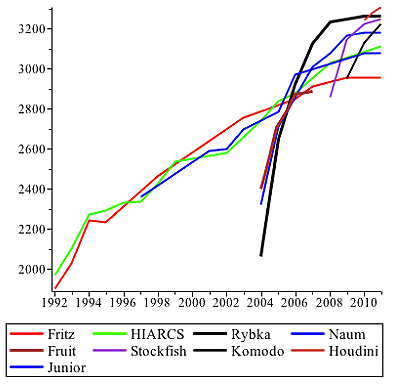Chess and the Open Source Revolution
From Tyler Cowen, via James Grimmelmann: Soren Riis has a really fascinating essay on the rather astonishing recent developments in the world of computer chess [Part 1, Part 2, and Part 3) focusing on the the lifetime ban, recently handed down by the organizers of the World Computer Chess Championships, issued against the author of "Rybka," a highly successful computer chess program, on the grounds that it is using "plagiarized" code.
It's a fascinating story in its own right, but particularly for what it says about innovation and information; here's the key figure, showing the improvements in computer chess play in the last two decades:

What happened in the mid-2000s that led to the sudden improvement in both the overall quality of computer and the rate at which new programs became seriously competitive? Riis writes:
What happened? Starting with the release of the first open-source Fruit in mid-2004, and continuing with the release of subsequent versions of Fruit, open-source engine Stockfish, and especially the release of reverse-engineered Rybka derivatives, highly detailed recipes for building strong, modern chess engines have been in the public domain. Fledgling chess programmers as well as programming veterans have not failed to take notice and the state of the art has advanced rapidly. As a result of this spread of knowledge new programs receive a tremendous performance boost and become "fast climbers".
There's a great deal more in the original essay about the nature of proprietary rights and the norms and customs in this particular community — well worth reading.




Eugene Volokh's Blog
- Eugene Volokh's profile
- 7 followers





